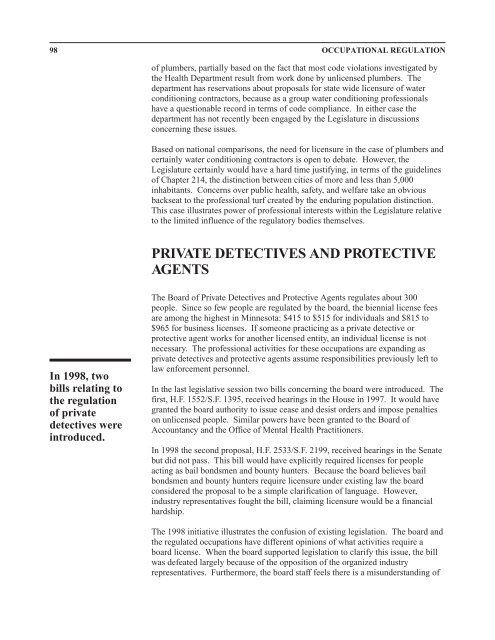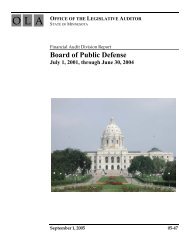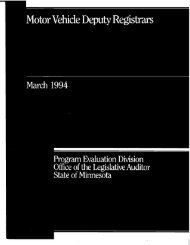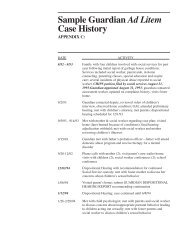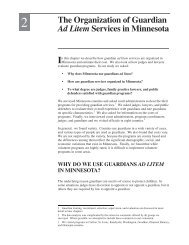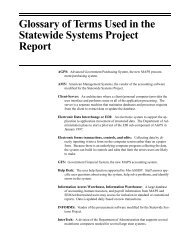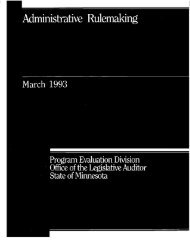Occupational Regulation - Office of the Legislative Auditor
Occupational Regulation - Office of the Legislative Auditor
Occupational Regulation - Office of the Legislative Auditor
Create successful ePaper yourself
Turn your PDF publications into a flip-book with our unique Google optimized e-Paper software.
98 OCCUPATIONAL REGULATION<br />
<strong>of</strong> plumbers, partially based on <strong>the</strong> fact that most code violations investigated by<br />
<strong>the</strong> Health Department result from work done by unlicensed plumbers. The<br />
department has reservations about proposals for state wide licensure <strong>of</strong> water<br />
conditioning contractors, because as a group water conditioning pr<strong>of</strong>essionals<br />
have a questionable record in terms <strong>of</strong> code compliance. In ei<strong>the</strong>r case <strong>the</strong><br />
department has not recently been engaged by <strong>the</strong> Legislature in discussions<br />
concerning <strong>the</strong>se issues.<br />
Based on national comparisons, <strong>the</strong> need for licensure in <strong>the</strong> case <strong>of</strong> plumbers and<br />
certainly water conditioning contractors is open to debate. However, <strong>the</strong><br />
Legislature certainly would have a hard time justifying, in terms <strong>of</strong> <strong>the</strong> guidelines<br />
<strong>of</strong> Chapter 214, <strong>the</strong> distinction between cities <strong>of</strong> more and less than 5,000<br />
inhabitants. Concerns over public health, safety, and welfare take an obvious<br />
backseat to <strong>the</strong> pr<strong>of</strong>essional turf created by <strong>the</strong> enduring population distinction.<br />
This case illustrates power <strong>of</strong> pr<strong>of</strong>essional interests within <strong>the</strong> Legislature relative<br />
to <strong>the</strong> limited influence <strong>of</strong> <strong>the</strong> regulatory bodies <strong>the</strong>mselves.<br />
PRIVATE DETECTIVES AND PROTECTIVE<br />
AGENTS<br />
In 1998, two<br />
bills relating to<br />
<strong>the</strong> regulation<br />
<strong>of</strong> private<br />
detectives were<br />
introduced.<br />
The Board <strong>of</strong> Private Detectives and Protective Agents regulates about 300<br />
people. Since so few people are regulated by <strong>the</strong> board, <strong>the</strong> biennial license fees<br />
are among <strong>the</strong> highest in Minnesota: $415 to $515 for individuals and $815 to<br />
$965 for business licenses. If someone practicing as a private detective or<br />
protective agent works for ano<strong>the</strong>r licensed entity, an individual license is not<br />
necessary. The pr<strong>of</strong>essional activities for <strong>the</strong>se occupations are expanding as<br />
private detectives and protective agents assume responsibilities previously left to<br />
law enforcement personnel.<br />
In <strong>the</strong> last legislative session two bills concerning <strong>the</strong> board were introduced. The<br />
first, H.F. 1552/S.F. 1395, received hearings in <strong>the</strong> House in 1997. It would have<br />
granted <strong>the</strong> board authority to issue cease and desist orders and impose penalties<br />
on unlicensed people. Similar powers have been granted to <strong>the</strong> Board <strong>of</strong><br />
Accountancy and <strong>the</strong> <strong>Office</strong> <strong>of</strong> Mental Health Practitioners.<br />
In 1998 <strong>the</strong> second proposal, H.F. 2533/S.F. 2199, received hearings in <strong>the</strong> Senate<br />
but did not pass. This bill would have explicitly required licenses for people<br />
acting as bail bondsmen and bounty hunters. Because <strong>the</strong> board believes bail<br />
bondsmen and bounty hunters require licensure under existing law <strong>the</strong> board<br />
considered <strong>the</strong> proposal to be a simple clarification <strong>of</strong> language. However,<br />
industry representatives fought <strong>the</strong> bill, claiming licensure would be a financial<br />
hardship.<br />
The 1998 initiative illustrates <strong>the</strong> confusion <strong>of</strong> existing legislation. The board and<br />
<strong>the</strong> regulated occupations have different opinions <strong>of</strong> what activities require a<br />
board license. When <strong>the</strong> board supported legislation to clarify this issue, <strong>the</strong> bill<br />
was defeated largely because <strong>of</strong> <strong>the</strong> opposition <strong>of</strong> <strong>the</strong> organized industry<br />
representatives. Fur<strong>the</strong>rmore, <strong>the</strong> board staff feels <strong>the</strong>re is a misunderstanding <strong>of</strong>


